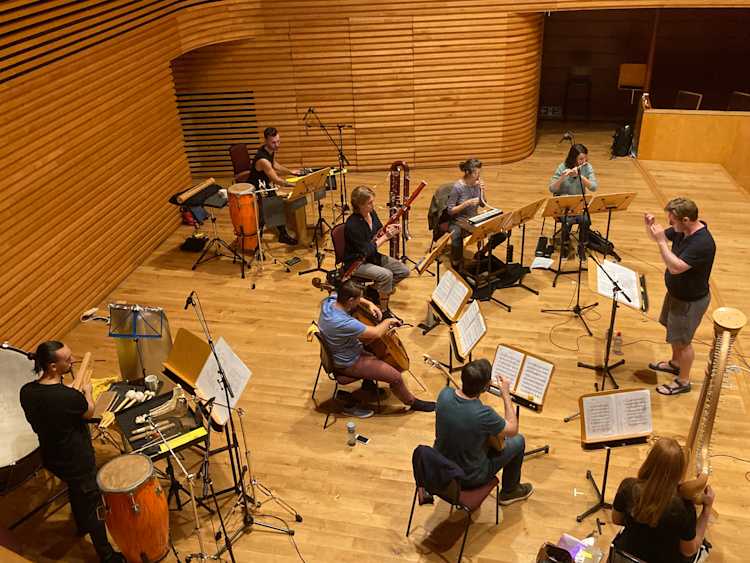Screens: Carefully Arranged Windows into Delicate Rituals of Sound
Glen Downie
“These musicians, no, between these musicians… are sounds,” states Frank Denyer, narrator and composer of Screens, the title and central track from the new album by Britain’s Octandre Ensemble, conducted by Jon Hargreaves—a ritual procession through the music of Denyer. This phrase, immediately preceded by loud, indifferent percussion, which in turn interrupted frail whispers of melody on the edge of inaudibility, aptly describes the tone and sensibility which imbues the whole album.
Octandre’s biography states that they are: “dedicated to exploring music with an emphasis on timbre and ritual,” and there’s no question from the opening few bars of Broken Music (1990) that Denyer’s music clearly embodies those principles in the extreme. Broken Music’s fragmentary presentation, rough timbres, and slow disentanglement offers the perfect chaperone for the procession that unfolds. As the music cracks, it opens a space, a physical & temporal space, in which the musicians start to carefully place sound as if placing delicate ceremonial objects to a preordained itinerary of actions and interactions.
This is music at its most ritualistic. The austere extremities of ritual are particularly evident in the album’s centrepiece and namesake Screens (in which the opening quote is recited) and in the album closer Five Views of the Path, the two most recent pieces (2017/18 & 2020/21), commissioned by Octandre themselves. Octandre’s intimacy with the material shines through not only in these two works, but also in the retrospective ones.
Screens is enveloped by two related retrospective pieces (both from 1973): Unison 1 and Unison 3. The tautness of expression present within Screens and Five Views of the Path is replaced by an ethereal sonorism for the first time, carefully brushed, and in a highly concentrated melodic form, of which only whisps reveal themselves in the other works.
A stunning occurrence in Unison 1 and Unison 3 appears when a single interval is repeated in rhythmic undulation, standing out from the long, flowing, shifting melody. For me, this undulation alludes to Broken Music, which plays with ritual as something rhythmic, something rough, repetitive, and bodily; but the restrained ritualistic filter applied to Unison 1 and Unison 3 is different to the tactile one of Broken Music, even when strong rhythmic profiles occur. Ultimately, both are tied to liveness and a unified physical and temporal experience. Ritual is liveness; it is the sharing of space between people, between minds, between objects, and in time. The score for Unison 1 embodies this sense of shared experience with a single unison line (only occasionally fraying into two) uniting all the players in their efforts.
Many of these works are framed by percussion, with delicate silky sonic screens punctuated by heavy formal borders: striking, loud, and present. The influence of East Asian music is clear, especially that of Japanese Gagaku. It informs the timbre, the spacing, and large-form rhythm of many of the pieces, but never strays into glib orientalism, owing to Denyer’s ethnomusicological background and sensitivity. Denyer sculpts the space as much as that of sound and action. Offstage sound sources pair with close-miked ones; the room and timbre (the latter the other founding principal for Octandre) interact in live space as much as the musicians within it. These formal percussive markers are always forward and present, whilst it is the melodious elements which appear in varying spatial planes: the soaring voice “offstage” vs the breathy bass flute fluttering as if within the ear itself.
So, why engage in music as ritual? Perhaps all music, to an extent, is ritual. Music is not simply the careful arrangement of sound—something Denyer achieves to great effect—; it is also something that in the first instance engages performers in action. Their actions prescribed, whether by oral instruction, text, or notation, whether general or precise, the act of making music is a performed communal activity. In the second instance, the act of attending a performance as an audience, to observe the ritual in action, is to share in that activity to bring about thought and contemplation. In Screens, Denyer’s music and Octandre Ensemble’s performance captures a sense of space and liveness of interaction that is compelling and present—we are all sharing in that space of contemplation.
To close, I offer some words from co-artistic director Christian Mason, which points towards an[other] answer: “[Denyer’s music] is a question of how to meaningfully cohere the diverse, and sometimes conflicting, raw elements of our contemporary awareness into an authentic—one might even say truthful—musical expression, in the midst of world where the very context of our artistic and cultural experience is so heavily mediated by coercive commercial and political forces that we can never be quite sure whether quiet/individual voices will even be heard, however urgent their message.”

Pictured: Octandre Ensemble recording Frank Denyer’s Screens, released November 2023.
Photograph by Christian Mason
Glen reflects on the recently-released Screens from Octandre Ensemble, an album of music by UK composer Frank Denyer.
Glen Downie is a composer originally from Aotearoa New Zealand. He is currently based in the UK studying towards a PhD in composition at the University of Cambridge with Jeremy Thurlow. His interests include various styles of composition, from the most precisely notated to the freest and most experimental forms of improvisation.
